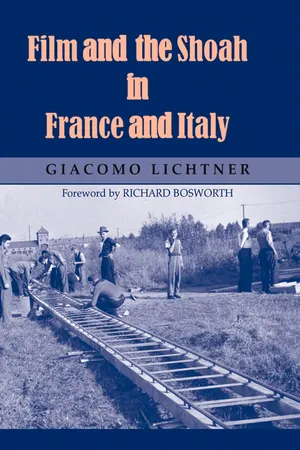
- 257 pages
- English
- PDF
- Available on iOS & Android
eBook - PDF
Film and the Shoah in France and Italy
About this book
Film and the Shoah in France and Italy is a uniquely comparative analysis of the role of cinema in the development of collective memories of the Shoah in these countries. The work follows a chronological structure of which three French documentaries - Night and Fog, The Sorrow, and The Pity and Shoah - form the backbone. These three sections are linked by comparative case studies on famous and lesser-known fictional works, such as Roberto Benigni's Life is Beautiful, Louis Malle's Lacombe Lucien, Armand Gatti's The Enclosure, and Radu Mihaileanu's Train of Life. The book tackles crucial themes, such as the politics of history and its representation, the 1970s obsession with collaboration, and the ethical debate around cinema's ability adequately to represent the Shoah. The book fulfils three complementary purposes: to offer a detailed historical and textual analysis of key cinematic works on the Shoah; to firmly situate the popular and institutional reception of these works within the political and socio-cultural context of the time, so as to link cinema to society's attitudes towards the Shoah; and thirdly, to show how these attitudes have changed over time, in order to evince the role cinema has played in the transmission of history and memory. Film and the Shoah in France and Italy shows that cinema has both reflected and affected the dominant perceptions of history, contributing to the transition from recognition to representation of the Shoah. The book also shows how this transition has been slow and uneven, and questions whether recognition and commemoration necessarily imply a deeper historical understanding.
Frequently asked questions
Yes, you can cancel anytime from the Subscription tab in your account settings on the Perlego website. Your subscription will stay active until the end of your current billing period. Learn how to cancel your subscription.
No, books cannot be downloaded as external files, such as PDFs, for use outside of Perlego. However, you can download books within the Perlego app for offline reading on mobile or tablet. Learn more here.
Perlego offers two plans: Essential and Complete
- Essential is ideal for learners and professionals who enjoy exploring a wide range of subjects. Access the Essential Library with 800,000+ trusted titles and best-sellers across business, personal growth, and the humanities. Includes unlimited reading time and Standard Read Aloud voice.
- Complete: Perfect for advanced learners and researchers needing full, unrestricted access. Unlock 1.4M+ books across hundreds of subjects, including academic and specialized titles. The Complete Plan also includes advanced features like Premium Read Aloud and Research Assistant.
We are an online textbook subscription service, where you can get access to an entire online library for less than the price of a single book per month. With over 1 million books across 1000+ topics, we’ve got you covered! Learn more here.
Look out for the read-aloud symbol on your next book to see if you can listen to it. The read-aloud tool reads text aloud for you, highlighting the text as it is being read. You can pause it, speed it up and slow it down. Learn more here.
Yes! You can use the Perlego app on both iOS or Android devices to read anytime, anywhere — even offline. Perfect for commutes or when you’re on the go.
Please note we cannot support devices running on iOS 13 and Android 7 or earlier. Learn more about using the app.
Please note we cannot support devices running on iOS 13 and Android 7 or earlier. Learn more about using the app.
Yes, you can access Film and the Shoah in France and Italy by Giacomo Lichtner in PDF and/or ePUB format, as well as other popular books in Media & Performing Arts & Film History & Criticism. We have over one million books available in our catalogue for you to explore.
Information
Table of contents
- Cover
- Front Matter
- Chapter 1
- Chapter 2
- Chapter 3
- Chapter 4
- Chapter 5
- Chapter 6
- Chapter 7
- Conclusion: Beyond Benigni
- Film and Bibliography
- Index